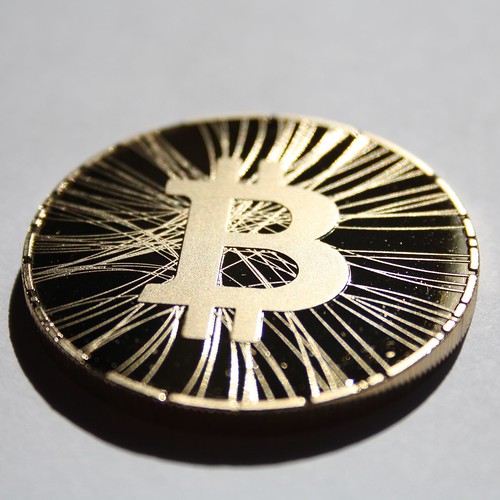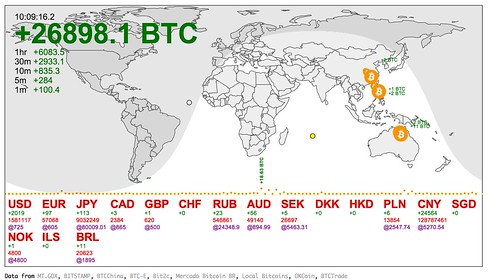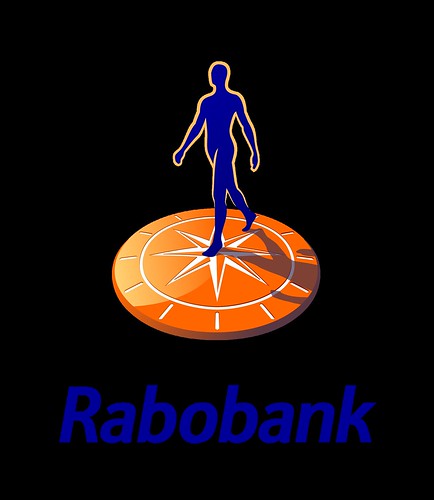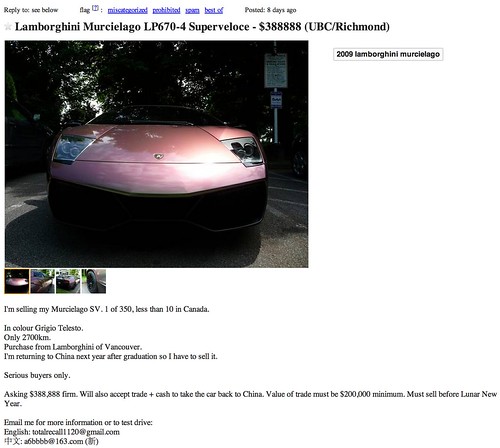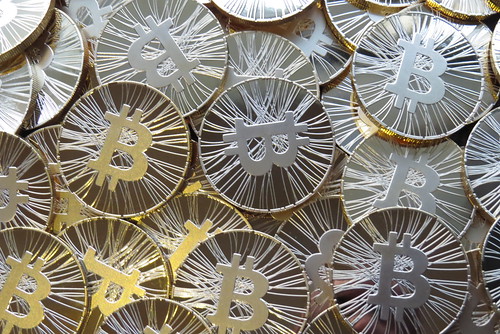
During a trip to San Francisco in mid October I landed at SFO just before 10:30 PM and took the train to the Hertz rental car desk. I have been using Hertz for years and I have disliked them for most of that time. It’s just like with most airlines, you don’t like their service and attitude but you have to use them because there is no better alternative. Car rental companies always try to upsell you with insurance (I don’t need it, which they should know after declining it tens of times already), they force you to top up the fuel before bringing back the car (otherwise you pay draconian prices for it), and they let you wait in line when you are tired after a flight. And in nicer cars they disable the GPS so you are forced to rent one at crazy expensive prices!
So in October I arrived at Hertz around 10:30 and there was a loooong line. Well, what can you do? Just wait in line for half an hour until the service people on duty are ready upselling stuff to other customers. I observed the process and came to the conclusion that their system is so inefficient. They take their time to scare people into adding unneeded options to their rental contract and even as a regular customer you still have to go through the upselling process (“You declined insurance, sir, do you know that you won’t be covered if you have an accident?” Well, actually I am covered by my own insurance but there is no use to discuss this with them). You need to sign several documents and then you are finally allowed to walk to your car.
At least, that’s normally the case. But not last time at SFO: for whatever reason cars were not ready yet and I had to sit down and wait before they had a car for me, just like all their other customers. It was around 11:15 PM by that time, and I was tired and just wanted to leave the airport and drive to my hotel.
So I started tweeting about the Hertz experience, and guess what: new car rental company Silvercar saw my tweet and told me to check them out next time. Because I had enough time on my hands I went to their website and was surprised to read about how they are trying to disrupt the car rental experience. I immediately decided to give them a try during my next trip to SFO.
Well, this week I was back in Silicon Valley and we (Frank and I) booked a car through Silvercar. With the company you always get a silver Audi A4 Quattro, so no crappy US or Japanese cars anymore, but a decent German car with a reasonable (2.0 Turbo) engine. Maybe not as good as our regular cars, but much better than what Hertz normally gets you. And for a very reasonable price, I think we paid something like USD 85 per day for the car, that comes standard with GPS (no need to pay for a separate GPS unit), wifi and satellite radio. Also no need to fill it up when you come back, they do that for you and you pay the normal gas price plus a $5 service fee (sensors calculate how full the gas tank is). And best of all: no lines and no upselling!
The experience started off a bit bad, because our executive assistant had booked Silvercar for us and set up her own account for that. We did not realize this would lead to problems, but when you use your own Silvercar account the confirmation code does not work. Normally you open the app the moment you get off the plane and you let Silvercar know that you have arrived. A concierge will pick you up from the arrivals hall or from the car rental area (at SFO you have to take the train to car rental, because SFO does not allow them to pick you up at arrivals) and drive you to the Silvercar parking lot. However, when we tried this the app told us we did not have the right permissions. However, Dave (our concierge), had seen that the plane had arrived and sent us a welcome text message. We tried to reply the message and call him, but for some reason (related to Google Voice) we could not reach him.
At the Silvercar waiting area at SFO there is a phone you can use to call them, but the phone was out of order… So we had a little problem, because we could not reach Silvercar. But then I remembered that they monitor Twitter, so I sent them a tweet. And that worked: within a minute I had a reply and Dave was on his way to pick us up. He apologized for what had happened and we had a nice chat about how Silvercar works.
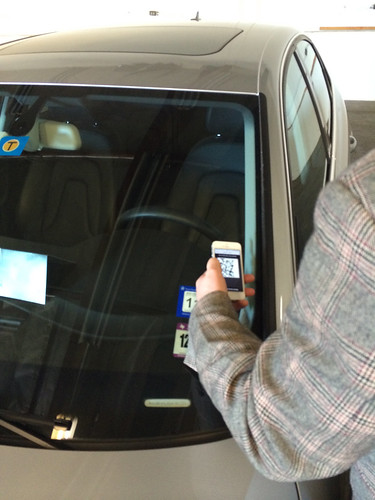
At their car lot we could choose the car that we wanted to take. They are all the same so we took the one closest to us. You scan the QR code on the front window with your iPhone and the doors unlock. It worked perfect! No waiting line, nu upselling, just scanning the code and driving away. I added myself as the second driver, which took just a minute and there was no extra fee for that (at Hertz it takes a much longer time and you have to pay for the privilege). Excellent!
We used the car for 3 days and liked the vehicle a lot. It has Sirius XM built in (all their cars have this, and it’s included in the price), so I could listen to the same satellite stations as in our cars in Canada. The Audi even has a toll tracking system built in so you can easily pay electronic tolls without having to stop, also something which is not a regular feature at Hertz. And it even has wifi built in, but I only found out about that after I returned the car (I did not read the short manual, my own fault).
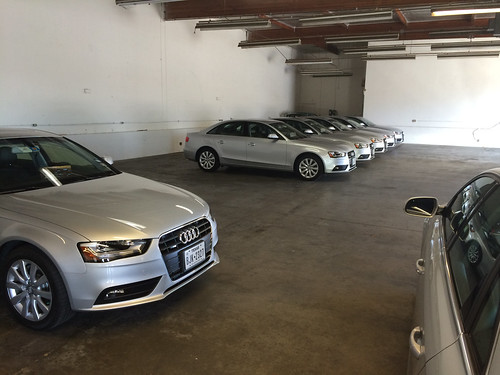
The car itself drove very well, the A4 Quattro has a a good suspension and accelerates reasonably fast. I actually started to appreciate Audi more than I did before. Their dashboard is well designed (actually better than the current low-end BMW and Mercedes models, something I had not expected), and I may even consider to buy an Audi in the future. Something a bit bigger and faster than an A4 Quattro though!
When we dropped off the car this afternoon the process was very efficient. You can just drive into the parking lot where sensors register that you are back. The sensors also calculate how much fuel you used and bill you for that at local rates (plus a one-time $5 fee) and they know if you had to pay toll fees anywhere. You immediately receive the bill in your email.
A concierge will drive you to the airport in your own car (so you can leave the luggage in the vehicle). Very convenient, especially because he drops you off at the terminal where you need to be. We had a quick chat with the manager to talk about their start-up and give some advice, we are investors after all. He immediately gave us a corporate discount and an another one for XPCP’s portfolio companies. That’s called Service with a capital S!
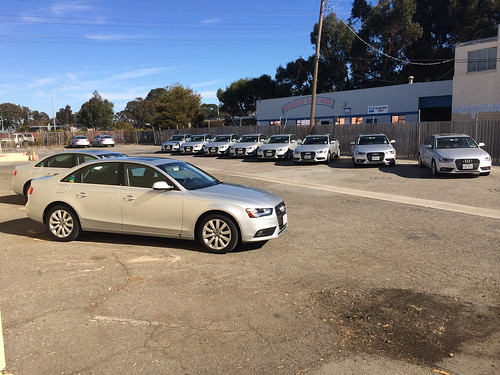
We’re now at the airport having a glass of wine in the lounge, and probably for the first time I look back at a great rental car experience. I will use Silvercar again during our next trips to the Valley and I will promote it to my friends as well. I hope Silvercar will manage to disrupt the car rental agency, I will support them!
Silvercar currently has rental cars at San Francisco, Los Angeles, Dallas (DAL & DFW), Houston and Austin. Prices are similar to what you pay for a Toyota Camry at a traditional car rental service. All cars have standard GPS, wifi, satellite radio and toll tracking. Check out the company at www.silvercar.com.

